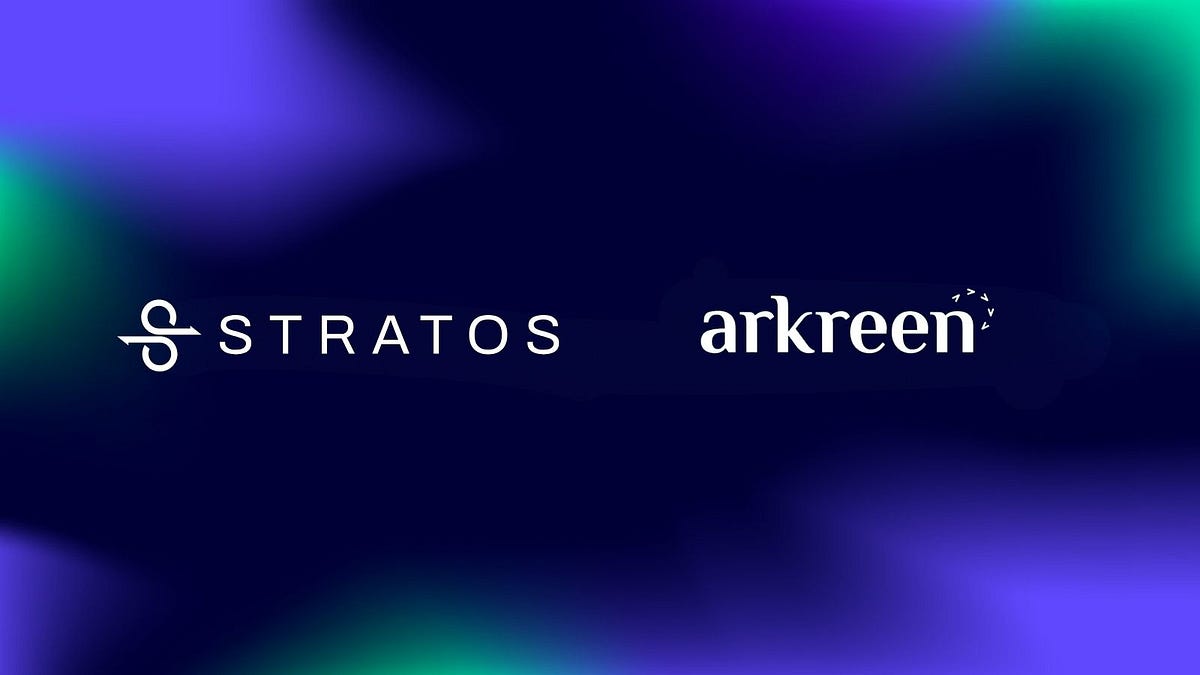Latest DePIN Funding News

3 months ago
Stratos Network Partners with Arkreen to Promote Sustainable Decentralized Infrastructure
Stratos Network is taking significant steps towards building a sustainable and decentralized infrastructure by partnering with Arkreen Network. This collaboration focuses on promoting renewable energy adoption and achieving carbon neutrality. Stratos Network is committed to offsetting its operational carbon footprint by leveraging Arkreen's green asset data, which reinforces its dedication to sustainability and responsible operations in the Web3 space.
In addition to their operational initiatives, Arkreen has extended an invitation to the founder of Stratos Network to participate in an upcoming Arkreen Talk. This event will provide a platform for discussing decentralized infrastructure, artificial intelligence, and sustainable energy solutions. The partnership aims to explore collaborative opportunities with eco-partners to advance Green DePIN initiatives, which are essential for promoting environmentally friendly practices within the Web3 ecosystem.
The integration of Stratos Network's scalable, decentralized storage and AI computation capabilities with Arkreen's on-chain Renewable Energy Certificates (RECs) through its AREC carbon offset protocol is set to revolutionize decentralized AI infrastructure. By harnessing green energy, both networks are not only enhancing their operational efficiency but also contributing to a greener future. This partnership exemplifies how decentralized technologies can align with sustainability goals, paving the way for innovative solutions in the renewable energy sector.

3 months ago
The Need for Privacy in Blockchain Adoption
In a recent discussion, Matthew Niemerg, co-founder of Aleph Zero, emphasizes the critical balance between transparency and confidentiality for businesses considering blockchain adoption. He draws parallels to the Renaissance banking practices of the Medici family, who maintained meticulous records while ensuring access was limited. Niemerg argues that the current push for radical transparency in blockchain transactions could deter businesses from embracing this technology, as it exposes sensitive information to competitors and market manipulators. He suggests that transparency should focus on verifying compliance with rules rather than making every business decision public.
Niemerg highlights that industries such as healthcare and financial services, which have successfully adopted blockchain, rely heavily on trust built over decades. The risk of exposing confidential information, such as patient records or corporate financial strategies, could undermine this trust. As businesses increasingly move operations on-chain, the need for privacy becomes paramount. For instance, a pharmaceutical company developing a new drug cannot afford to disclose its research investments, nor should a retail chain reveal its inventory management strategies through visible smart contracts.
To address these privacy concerns, Niemerg advocates for the integration of privacy-preserving technologies, such as zero-knowledge cryptography, into blockchain systems. This approach allows for transaction verification without revealing sensitive details, thus maintaining the trustless nature of blockchain while protecting business information. He warns that without robust privacy solutions, enterprises may gravitate toward private, permissioned networks, which could fragment the blockchain ecosystem. Ultimately, Niemerg calls for a shift in blockchain design philosophy, urging developers to prioritize confidentiality as a foundational element to ensure practical business adoption and the long-term viability of public blockchains.

3 months ago
JetBolt Emerges as a Contender in the Crypto Landscape
In the ever-evolving landscape of cryptocurrency, 2023 has seen established players like Solana (SOL), Ripple’s XRP, and Cardano (ADA) continue to drive blockchain innovation. However, new contenders are emerging, with JetBolt (JBOLT) capturing significant attention due to its revolutionary zero-gas technology and a highly successful presale. This article explores why JetBolt, alongside other notable cryptocurrencies such as Polkadot (DOT), Kaspa (KAS), and Sui (SUI), is being touted as a top pick for massive growth potential in the coming years.
JetBolt (JBOLT) is making waves with its innovative approach to blockchain transactions, allowing for fast and gas-free operations. With over 320 million JBOLT tokens sold, the project is rapidly gaining traction among investors and developers alike. The platform’s integration of artificial intelligence enhances its functionality, offering users a seamless interface for accessing crypto news and market data. Additionally, JetBolt's staking mechanism provides not only token yields but also extra bonuses for active participants, making it an attractive option for both seasoned investors and newcomers to the crypto space.
Other cryptocurrencies like Solana and XRP are also positioned for growth. Solana is recognized for its high transaction speeds and low fees, while XRP continues to navigate legal challenges but remains a strong player in cross-border payments. Meanwhile, projects like Kaspa and Sui are noted for their innovative architectures that enhance scalability and transaction efficiency. As the crypto race heats up, JetBolt stands out among these giants, potentially leading the next wave of blockchain advancement with its unique offerings and successful presale strategy.

3 months ago
Remittix: The Altcoin Poised for 50x Gains in 2023
In the ever-evolving cryptocurrency landscape, investors are keenly searching for altcoins with maximum growth potential. Among the promising options for February are Stellar (XLM), Theta Network (THETA), and Remittix (RTX). Each of these projects offers unique value propositions, but Remittix is particularly noteworthy for its innovative approach to merging cryptocurrency with traditional finance. This article delves into the strengths of these projects and highlights why Remittix is being touted for potential 50x gains.
Stellar (XLM) has long been recognized for its role in facilitating cross-border payments. The decentralized network allows for direct connections between financial institutions and individuals, eliminating intermediaries and reducing costs. Stellar's partnerships with major entities like IBM and MoneyGram enhance its credibility in the $700 billion global remittance market. Despite its stable position, analysts predict a gradual price increase for XLM, though it may not meet the aggressive targets set by investors for 2025. Meanwhile, Theta Network (THETA) is revolutionizing the video streaming industry by leveraging blockchain technology for peer-to-peer content distribution. Its partnerships with tech giants like Google and Samsung bolster its market presence, although it faces challenges in scalability and competition from traditional streaming services.
Remittix (RTX) stands out as a game-changer by addressing a significant gap in the financial landscape: the lack of banking access for over 1.7 billion people worldwide. By enabling users to convert more than 40 cryptocurrencies into fiat currency for direct bank transfers, Remittix offers a cost-effective alternative to traditional remittance services. The project has already gained traction with over $12 million raised in its presale, and experts predict a potential 50x price surge post-launch. Unlike Stellar and Theta, Remittix's utility token model allows for real-world applications, making it an attractive investment for those looking to capitalize on the future of finance. Investors are encouraged to consider Remittix as a leading contender in the altcoin market, especially as it prepares for its presale conclusion.

3 months ago
Voltix and Solpen Join Forces to Advance AI-Led DePINs on Solana
Voltix, a prominent player in AI innovation, has initiated a strategic collaboration with Solpen, a well-known platform operating on the Solana blockchain. This partnership aims to accelerate the expansion of AI-led Decentralized Physical Infrastructure Networks (DePINs) within the Solana ecosystem. By merging Voltix AI’s transformative capabilities with Solana's scalable and high-speed blockchain technology, the collaboration seeks to enhance operational efficiency across decentralized networks, ultimately benefiting the communities of both platforms.
Voltix AI has labeled this partnership with Solpen as a significant milestone. The collaboration is expected to broaden opportunities for users of both platforms, providing them with exclusive benefits derived from the strengths of each company. A key feature of this development is the introduction of SOLPEN Sprite, an innovative forum designed to facilitate user engagement within the ecosystem. SOLPEN Sprite allows community members to mine tokens, receive DePIN airdrops, and unlock a variety of AI-driven incentives, encouraging active participation and showcasing the practical advantages of integrating AI technology with decentralized systems.
According to Voltix AI, this collaboration enhances overall system security while combining the diverse technological expertise of both firms. The anticipated synergy is expected to streamline operations within decentralized ecosystems, potentially establishing a new benchmark in the rapidly evolving convergence of AI and blockchain sectors. As both industries continue to grow, this partnership represents a forward-thinking approach to harnessing the power of AI in decentralized environments.

3 months ago
GRASS Cryptocurrency: Transforming Unused Bandwidth into Profit
GRASS, a new cryptocurrency, is revolutionizing the way we perceive and utilize unused Internet bandwidth. Operating within the framework of the Decentralized Physical Infrastructure Network (DePIN), GRASS allows users to become digital landlords, sharing their surplus bandwidth with businesses that require enhanced digital capacity for tasks such as AI training and market research. This innovative model not only transforms dormant digital resources into profitable assets but also creates a win-win ecosystem where both users and enterprises can benefit. Security is a top priority, with robust measures in place to protect personal data, certified by leading antivirus companies to ensure network integrity.
As GRASS grows, it faces potential regulatory challenges that could impact its operations and the broader decentralized model. The initiative represents a significant shift in connectivity and commerce, suggesting a future where the underutilized bandwidth of everyday users contributes meaningfully to the digital economy. By effectively monetizing idle Internet resources, GRASS is poised to redefine how individuals engage with Internet services, turning them into key players in this emerging financial landscape. The cryptocurrency market is expected to grow significantly, and infrastructure-based cryptocurrencies like GRASS are likely to see even faster growth due to their practical utility.
In conclusion, GRASS not only offers a passive income stream for users but also promotes sustainability by utilizing existing Internet resources. While the model presents exciting opportunities, it is not without its challenges, particularly concerning regulatory frameworks and data privacy. As the market evolves, GRASS may pave the way for a new era of decentralized applications and Internet infrastructure, encouraging users to explore this innovative financial model while remaining informed about potential risks and security measures.

3 months ago
Streamr's Vision for 2025: A Decentralized Future
As we approach 2025, Streamr is set to undergo a significant transformation, evolving from a background infrastructure provider to an open platform for freedom technology applications. This shift aims to leverage the decentralized data network, allowing Streamr applications to coexist within a broader ecosystem that enhances network effects for all participants. The focus is on creating a community-owned network that prioritizes data sovereignty, offering a stark contrast to the monopolistic platforms that dominate the digital landscape today. Streamr envisions a future where freedom tech is not just a niche but a fundamental aspect of the free Internet, positioning itself as the nervous system of this new paradigm.
One of the standout features of Streamr's evolution is the introduction of StreamrTV, a pioneering consumer-facing web application that will enable users to broadcast live video through a fully decentralized data network. This initiative is set to launch in the first half of 2025 and represents a significant milestone in demonstrating the capabilities of decentralized freedom technology. Unlike traditional applications, Streamr apps will rely on the Streamr Network for their core functionalities, emphasizing real-time communication and live streaming as foundational elements. This approach not only showcases the potential of decentralized applications but also aims to provide seamless, real-world experiences for users.
The role of the DATA token is also evolving within the Streamr ecosystem, serving as a utility token that powers decentralized data streaming and project governance. Users can stake DATA to discover content, access premium features, and contribute to network effects while earning tokens in the process. This dual approach to value capture at both the protocol and application levels ensures that incentives are aligned among node operators, developers, and the broader community. As Streamr prepares for a year of bold moves and ambitious goals, it invites everyone to participate in shaping the future of decentralized streaming, highlighting the importance of community engagement in this transformative journey.

3 months ago
Decentralizing Infrastructure: The Rise of DePINs
Decentralized Physical Infrastructure Networks (DePINs) are revolutionizing the management of both digital and physical infrastructure by enabling individuals to contribute and monetize various resources, such as wireless coverage, mapping data, GPS positioning, and IoT device data. This innovative approach leverages blockchain technology and cryptoeconomic incentives, allowing participants to earn rewards for their contributions. The article highlights four key projects within the DePIN space: Helium, Hivemapper, GEODNET, and AYDO, each focusing on different aspects of decentralized infrastructure, including wireless communication, mapping, positioning, and IoT data-sharing.
While all these projects share the DePIN framework, their participation models and hardware requirements vary significantly. Helium allows users to deploy hotspots for decentralized wireless networks, while Hivemapper incentivizes the installation of dashcams for real-time mapping data. GEODNET enhances GPS accuracy through rooftop satellite miners, and AYDO stands out by enabling users to connect existing IoT devices to blockchain networks without the need for proprietary hardware. This flexibility positions AYDO as a unique player in the DePIN landscape, catering to a broader audience by supporting widely used IoT protocols.
Despite the promise of DePINs, several challenges remain. Issues such as hardware accessibility, market demand for data, security, and regulatory uncertainty could hinder the widespread adoption of these models. The success of IoT-focused DePINs will depend on their ability to ensure interoperability, economic sustainability, and compliance with privacy regulations. As the DePIN ecosystem continues to evolve, it is evident that different models may cater to various sectors, offering a compelling alternative to traditional corporate-controlled infrastructure, while empowering individuals with greater control over their contributions and rewards.

3 months ago
Litecoin, Jito, and Bittensor Experience Significant Price Rallies Amid Market Recovery
In the past week, Litecoin (LTC), Jito (JTO), and Bittensor (TAO) have experienced significant price rallies, with gains ranging from 17% to 22%, according to CoinGecko data. This upward momentum can be attributed to Bitcoin's resilience amid various macroeconomic factors, including the U.S. Consumer Price Index (CPI) and tariff announcements. As Bitcoin continues to stabilize, altcoins like LTC, JTO, and TAO are also benefiting from this market-wide recovery, with LTC gaining 2.53%, JTO increasing by 5.68%, and TAO rising by 2.98% on the same day, as reported by TradingView.
On-chain analysis from Santiment reveals that Litecoin's total open interest has surged to $416.87 million, indicating increased trader activity. Similarly, Jito has seen a rise in social dominance and trade volume, reflecting heightened interest from both institutional and retail traders. Meanwhile, Bittensor's trading volume has remained steady, although recent data suggests a bearish sentiment among derivatives traders. The technical indicators for LTC, JTO, and TAO all point towards potential further gains, with LTC aiming to retest its 2025 peak, while JTO and TAO also have key resistance levels to watch.
Market sentiment has been bolstered by speculation around potential ETF approvals, particularly for Litecoin, which is seen as having a 90% chance of approval according to Bloomberg's Eric Balchunas. This anticipation has been a significant driver for LTC's recent performance. Additionally, the upcoming Dynamic TAO update, likened to Ethereum's Merge, has generated excitement within the Bittensor community, further contributing to its price rally. As the crypto market continues to evolve, these developments highlight the dynamic nature of altcoin trading and the factors influencing investor sentiment.

3 months ago
Teneo Protocol Secures $3 Million Funding to Democratize Social Media Data Access
Teneo Protocol, a decentralized protocol aimed at democratizing access to social media data, has successfully secured $3 million in seed funding. This funding round was led by notable venture capital firms RockawayX and Borderless, with additional participation from Generative Ventures and others. The investment will support Teneo's mission to transform the data economy by incentivizing users to unlock public social media data. With a growing global network of several million users, Teneo is poised to make significant strides in facilitating access to valuable data resources that are increasingly restricted by major social media platforms.
The challenge of accessing social media data has intensified as platforms like Reddit begin to charge businesses for data access, creating barriers that could stifle innovation in artificial intelligence (AI) and other sectors. Teneo aims to address this issue through its Community Node, a Web3 browser extension that allows users to collect public posts from platforms such as X (formerly Twitter) and Reddit. Users are rewarded with Teneo Points for their contributions, which can later be converted into Teneo Tokens once the network's native token is launched. This initiative not only enhances data accessibility but also opens new avenues for industries that rely on real-time social data, including AI, finance, and marketing.
The Teneo Community Node has already gained traction, boasting over 3.9 million users across 191 countries, with more than 1.1 million users connecting their digital wallets to the platform. Investors express enthusiasm for Teneo's potential to reshape the data landscape, emphasizing the importance of decentralized solutions in the evolving data economy. As Teneo continues to develop its platform, it aims to empower individuals by returning data ownership to the people, fostering a community-driven approach to data utilization and innovation in the digital age.
Signup for latest DePIN news and updates